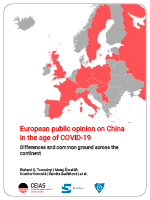The COVID-19 has had a tremendous impact on European societies and economies and put the relations between European countries and China’s on the spotlight. The pandemic has irrupted at a time of a reassessment of these relations and the endorsement of a more critical approach towards China by the EU and most EU member states. The current publication offers a valuable insight on the impact of these dynamics on the European public opinions of China. It points out to predominantly negative perceptions and a widespread degradation of the image of the Asian country, with few exceptions.
This report, from the Central European Institute of Asian Studies (CEIAS) and the Palacký University Olomouc, is the first of a series written in collaboration with thirteen top European think tanks, including the Elcano Royal Institute, based on wide-scale survey of public opinion on China conducted in eleven EU countries plus Russia, and Serbia, in September-October 2020. It aims at providing a European and detailed country-level analysis of evolving European perceptions of China in the post COVID-19 era.
It offers a cross-country comparative analysis of the image of China vis-a-vis other major international actors (the EU, the US, and Russia). Among others, it explores the perceptions of the components of China’s power (economic, military) bilateral relations (trade, investment, culture, and technological cooperation) and China’s international engagement (including the Belt and Road Initiative, and China’s on impact global environment), as well as policy preferences and trust towards the Asian country. It also covers the perceived role of China during the pandemic. Overall, this report highlights the limits of China’s soft power in Europe, the resilience of transatlantic ties, and a clear preference for the EU.


